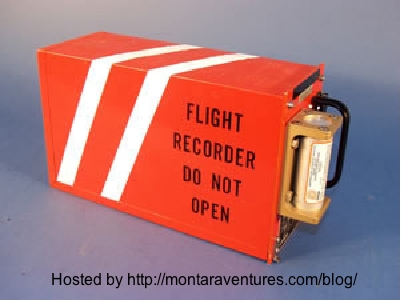“Black box” or flight data recorder from the aviation industry

These systems for recording and preserving sensor data through air related events have been around since the 1950’s and came into being as a result of mysterious incidents involving the de Havilland Comet jet airliner. The general idea being, it’s good to know what was going on in the vehicle as the event occurred rather than guess or wait for an event to happen again. FDRs have been very successful in the last 50 years to help us understand what has happened in some sort of incident. FDRs come in various flavors some recording just a few sensor inputs like airspeed, altitude, etc. and now most are required to record 88 different sensor inputs. The instrument itself must also be “survivable” – that is specified as being able to withstand 3400 g’s of force for 6.5 milliseconds; as well as fire, crush, penetration, and fluid immersion resistance. They’re pretty durable pieces of equipment.
de Havilland Comet

Now the concept is being introduced to cars. Well, let’s restate that, it’s already in cars and has been there since the mating of the microchip and the motor car in the 1980’s. It has progressed rather slowly from a technology standpoint to where we are today. Systems like OnStar work in concert with the onboard computer to notify a central monitoring center in the case of an event, say air bag deployment, then a human will attempt to communicate with the vehicle via a satillite phone link.
There is a furor over privacy now as a result of a mandate by the National Highway Traffic Safety Administration that automakers must inform consumers that a black box has been installed and is functional by September 1, 2010. That seems fair, but what about all the black boxes already installed and functional?
Privacy is an interesting thing, in today’s world it’s more of an illusion than a fact. If you’re reading this, you’ve sacrificed some privacy – to gain access to bandwidth, through whatever proxies and filters you might be transiting, through the search or rss/atom feed you used to get here, and finally when accessing this content. If you talk on a wireless hand set or mobile phone, there goes more of your privacy. When is the last time you provided your credit card # or social security # over such a device? And of course, you do shred all your confidential information before disposing of it, right?
The point I’m making is that privacy is an illusion and unless you pay attention to preserving it constantly, you don’t have it. There is potential for misuse of black box data, that is true of all data sources, but I think the benefit tends to outweigh the risk in this case. If there really is a security concern, provide a switch for a consumer to turn it off. It’s that simple. Meanwhile, black boxes in cars is a step forward in my view. I kind of like the idea that someone would a) notice and b) take action to help if the situation merited it.
Technorati Tags: Black Box | Flight Data Recorder | Cars
« Birthday Blues
» $100M Venture Capital Giveaway
Innovation, Technology & Science
“Black boxes” for cars
08.22.06 | 3 Comments
3 Comments
« Birthday Blues
» $100M Venture Capital Giveaway









You peanut! In a world that is ever increasing safety levels to save the stupid from themselves, society only has a few options of population control. One of which is to have people who cannot control the technology they posess, this can be an efficient method to stop the overpopulation of planet Earth. Planet Earth according to some scientific theories can only sustain the current population growth for another one-hundred years before society will suffer cataclysmic over-consumption of resources. Chiefly of which is oxygen and given the largest consumption environmentally of car life-span is the construction phase building newer cars with increasing amounts of plastics and indviduality inhibitors seems to advocating the destruction of civil rights and then the species in general. You ought to consider your own lack of talent behind the wheel as warning to yourself or better still buy a sports-car and naturally select yourself in our technological environment you perceptionaly inept ****-tard. PS Try hitting a telegraph pole please!!!!!!!!!!!!!!!!!!!!!!!!!!!
Everyone is entitled to their opinion; even an ill formed, insult-laden opinion. Isn’t freedom of speech grand?
I myself is in favor of EDRs being incorporated to cars. I think this should not be very much of a privacy concern but more of a safety awareness.